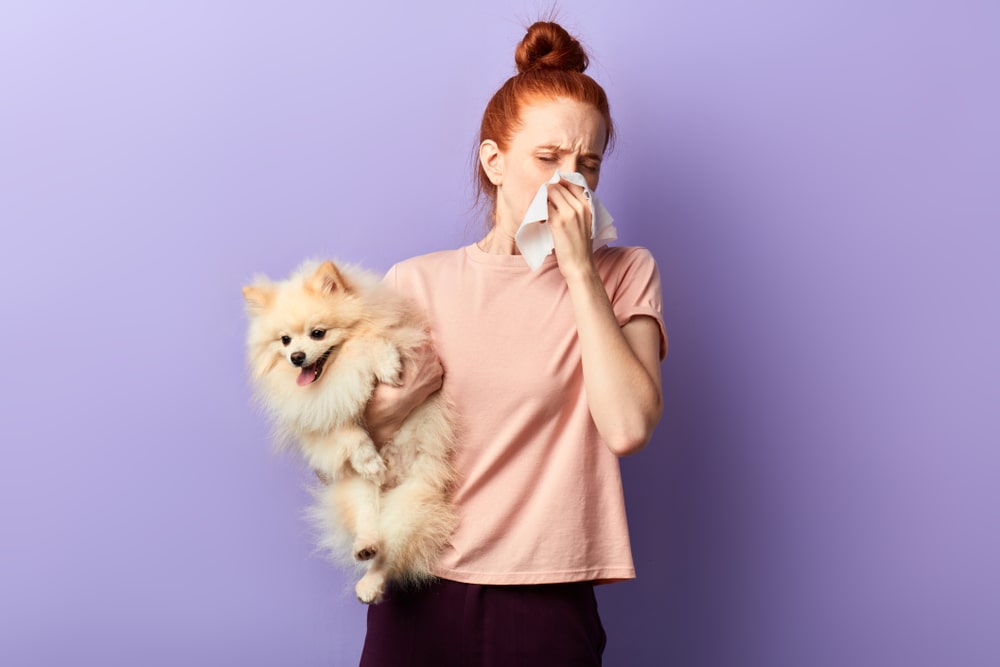Hey Ollie blog readers! We’re offering you an exclusive 60% OFF your starter box! Try now!
You share everything with your very best friend. Maybe your dog sleeps in your bed or lounges on the couch with you. What about when you’re under the weather? Staying in bed cuddled up with the dog might make you feel a lot better but could you make your pet sick?
What diseases CAN’T be passed from you to your dog?
If you have a common cold or even the flu you’re safe to snuggle up and make the best of the couch time. Plenty of rest and fluids for you and a good movie and nap with the dog will have you feeling better in no time.
Note that dogs do get their own forms of the flu so if you see flu-like symptoms in your dog, make sure you get them to the vet!

What diseases CAN be passed from you (or other members of the family) to the dog?
-
Mumps
“Though rare, dogs can become sick after exposure to the mumps virus from an infected person,” says Dr. Jennifer Coates, veterinary advisor with petMD . If someone in your home or that you’ve come into contact with is infected with mumps, watch your dog for signs of illness. Signs of mumps in dogs include fever, no appetite, and swelling in the salivary glands.
While there is no cure for mumps in dogs you will want to work with your vet to treat your dog’s symptoms and keep him comfortable while he recovers.
-
Salmonella
While this bacteria is often associated with “food poisoning” it can also sicken your dog. Like you, your pet can get nausea, vomiting, diarrhea and abdominal cramps. Be sure to use safe handling techniques with raw meats and seafood to prevent the spread of salmonella. You also want to make sure your pet isn’t drinking from the toilet bowl or getting snacks out of the trashcan as these both can be sources of salmonella.
-
Ringworm
Ringworm is a skin disease that can impact both humans and animals. While it sounds like the name of a parasite, it is actually a fungus. Ringworm can be passed from human to animal or vice versa or through contaminated objects like hairbrushes or bath towels. “We treat that topically with anti-fungal medications, and treat it systemically with an anti-fungal suspension or oral pill, if necessary. We also use shampoos or dips to minimize the spread of spores to avoid further infection,” says Dr. Adam Denish of Rhawnhurst Animal Hospital in Pennsylvania. If you or anyone in your family has ringworm, you will want to keep the infected area covered so you can’t transmit it to your dog.
-
Giardia
A common waterborne illness, giardia can make both you and your pet sick. Symptoms include both diarrhea and weight loss. This protozoan is found in animal feces and is more likely to be transmitted from dog to dog in conditions like shelters and puppy mills. Dogs in the southern US are also more prone to getting giardia. To diagnose, your vet will examine a fecal sample from your dog. If it is positive, an antibiotic prescription should have your pet feeling better in no time. As far as where you can get it – pools, hot tubs, spas, and lakes can all transmit giardia to humans too. If you think you’ve been infected get to the doctor ASAP you don’t want to infect your pet or anyone else in your home.
Other diseases your dog can pass to you:
-
Tapeworm
Tapeworms are parasites spread to dogs, cats, and people when they ingest infected fleas. Tapeworms in your dog can be seen with the naked eye as the worms shed “segments” that can be found in your pet’s stool or in the hair near their rear ends. In severe infections, pets can lose weight and have mild diarrhea. Humans may show similar symptoms but this is less common. To prevent the spread of tapeworm, your best bet is to control the spread of fleas in your home, lawn or other areas you frequently visit.
-
Leptospirosis
Leptospirosis is a bacterial disease impacting both people and animals. It is passed through contaminated water, urine or other body fluids from an infected animal, most commonly rats. It is difficult to detect early stages of leptospirosis in animals, but the disease can lead to kidney and liver failure if it is not treated. This can onset rather quickly.
People who become infected with leptospirosis might not show signs of the disease. Others will have flu-like symptoms that begin anywhere from 48 hours to a full week post-exposure. These symptoms usually improve without medical treatment but can come back and lead to more serious illnesses.
-
Rabies
You can absolutely get rabies from a dog. If you are ever bitten by a dog you don’t know it is important that you try to locate the owner of the dog to determine if the dog has had the rabies vaccine and when. If the dog has not been tested for rabies it is important that the dog (and you) are tested and treated as indicated. Rabies, a fatal neurologic disease that impacts both animals (not just dogs) and humans. To spot an infected dog, you may see sudden behavioral change and progressive paralysis. Rabies is easily prevented by vaccination.
According to the CDC: “In people, symptoms can onset days to months after exposure and include weakness, fever, and headache. Within a few days, symptoms will progress to confusion, anxiety, behavioral changes, and delirium.”
-
MRSA (Methicillin-resistant Staphylococcus aureus)
Staphylococcus aureus is a common type of bacteria that is found on the skin of both people and animals. Methicillin-resistant Staphylococcus aureus (MRSA) is the same bacterium that has become resistant to some antibiotics. Dogs and other animals often can carry MRSA without having any signs of illness. It is important to know that MRSA can cause a variety of infections, impacting the skin, respiratory tract, and urinary tract.
MRSA can be transmitted back and forth between you and your pet through direct contact. In humans, MRSA most often causes skin infections that can range from mild to severe. If left untreated, MRSA can spread to the bloodstream or lungs and cause life-threatening infections. MRSA in humans is a commonly occurring hospital-acquired infection. If you or a member of your family has been hospitalized recently, be sure to take necessary precautions to ensure MRSA is not being spread.
-
Mange
While there are a few conditions that fall under the category of Mange, Sarcoptic mange is a type that can be transmitted to people. Sarcoptic mange is a parasitic skin disease that is caused by very small mites. This irritating skin condition is transmitted between animals through close contact. In dogs, the mite causes bad itching and self-inflicted wounds from scratching.
While people can’t become infected with the canine version of sarcoptic mange, they can have a minor local reaction from the mites if they come in contact with an infected dog.

How to keep your dog healthy
Just like you wash your hands, take the necessary precautions and consult with your doctor, you want to do the same to help your dog stay healthy.
- Visit the vet annually for a wellness checkup and appropriate vaccines. Your dog’s doctor will help you with a vaccine schedule that is compliant with local laws and appropriately protects your pet from diseases.
- Manage fleas to prevent the risk of flea-related illnesses like tapeworms.
- Wash your hands regularly and bathe your pet as appropriate.
- If you or your pet has a contagious illness, wear gloves/skin protection as needed and minimize contact until it has been appropriately treated.
The Ollie blog is devoted to helping pet parents lead healthier lives with their pups. If you want to learn more about our fresh, human-grade food, check out MyOllie.com.
Tagged As:

The nutrition your dog needs,
the food they want.

Enjoying our articles? Subscribe our Newsletters and get new articles directly to your inbox
You might also like
18 July 2025
6 MINS READ
Can You Mix Fresh Dog Food With Kibble?
If you’re feeding your dog kibble but want to upgrade their bowl, you’re not alone. Many pet parents ask if they can mix fresh dog food with kibble to get some of the benefits of fresh food wi…
by Ollie Pets
18 July 2025
5 MINS READ
Does Fresh Dog Food Help With Weight Loss?
If you’ve noticed your dog carrying a few extra pounds, you’re not alone. According to the Association for Pet Obesity Prevention, over half of dogs in the U.S. are overweight or obese. Extra …
by Ollie Pets
18 July 2025
4 MINS READ
Is Fresh Dog Food Cooked or Raw?
When you hear “fresh dog food,” it’s normal to wonder if that means raw meat or something cooked. After all, fresh just means it’s not dry kibble or canned food packed with preservatives. …
by Ollie Pets







